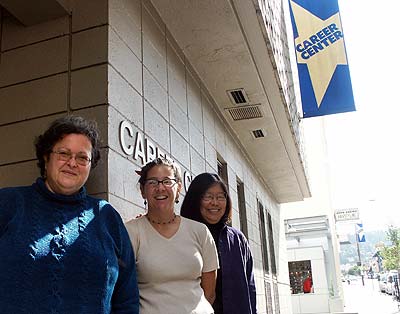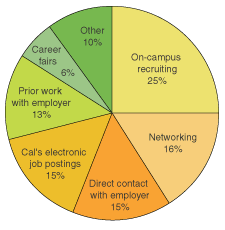 |
Linda Hernandez, Ruthann Haffke and Susan Kishi are just three of the Career Center's 17 counselors. (BAP photo) |
Class of 2003 shouldn't give up in the face of a tough job market, say Career Center advisers
BERKELEY - When this year's graduating students file out of UC Berkeley's Greek Theater in their caps and gowns on Thursday, they will be walking into a job market radically different from the one they started school in.
"When this class entered Berkeley in 1999, they came in during the most robust economy of their lifetime. Now that doesn't exist anymore," says Tom Devlin, Director of UC Berkeley's Career Center. "Many are experiencing anxiety and frustration - they've worked hard for four years, gotten excellent grades, had challenging internships, and been really focused on what they want to do and where they want to do it. And now they're hitting a brick wall."
How Berkeley students find jobs  |
With the U.S. economy still in retraction - and the Bay Area's in even worse shape - "the most successful job-hunting students are those who are flexible in terms of their desired industry and geographic area," says Devlin. "The Bay Area is obviously experiencing a difficult time, but other parts of California are somewhat better."
Things are very different from the dot-com heyday, when some graduating students waltzed into six-figure jobs and fat signing bonuses after only a two-week search. But UC Berkeley students still possess an edge over most applicants. The center's counselors urge those Cal students who haven't found jobs not to despair, but to understand that today's job market will likely require a carefully plotted, two- to six-month hunt - one that also covers informational interviews, follow-up phone calls, internships, and nontraditional employment.
The grad-school safety net
The 2003 Senior Survey, in which students tell the Career Center of their postgraduation plans, will not be complete until six months after Commencement, but Devlin thinks the numbers will closely resemble the last two years. "Of the 6,000 students who earn bachelor's degrees each year, about two-thirds tend to go into the workforce, one-fifth go directly to graduate school, and the remainder end up in a variety of areas like the military, volunteer programs, or taking time off," he reports. Median salaries for most industries have stayed steady; more detailed information about salaries will not be released until January 2004.
Due to the economy, there has been a slight annual rise in the number of students who choose to stay in school and defer the job search. In the class of 2001, 17 percent went directly to graduate school; for 2002, that portion rose to 21 percent. "We envision it will rise a few points in 2003," says Devlin.
"More engineering students are saying that since getting a master's in their fields is important to many employers and is in their future plans anyway, why not get it now," says Linda Hernandez, a Career Center counselor who deals with engineering majors. "I've seen this before when jobs are scarce. Students look for a job and apply to grad school at the same time and later decide their course of action based on their success in the job market or getting into a particular school."
| Career Center's CalJobs site offers résumé services as well as
lots of job listings Since November the Career Center — along with 26 other universities — has been building a new job-posting system. Once on the UC Berkeley CalJobs website, students can post up to 10 résumés and track their entire job-application process. Employers can post job listings on the UC Berkeley site for free, unlike other online job-posting services like Monster.com and Craig's List. As a result, the number of jobs posted has not only swelled, but the listings include a broader range from internships to part- and full-time jobs, some requiring a few years' experience. After five months of operation, 13,000 UC Berkeley students had registered for the site, which was averaging more than 2,000 job listings per day. |
Hernandez says she cautions students who go straight into a masters program, to get summer or internship experience along the way to become more competitive, as most of the huge increase in graduate school enrollment has come from people who have already been in the workforce. "I tell them, 'When you come out with your master's, you'll often be competing with people who in addition to a master's degrees have one or two years in the workforce,'" she says. Research with a professor or graduate student also increases a students' competitiveness.
Many students use graduate school as a safety net, either to delay the job search or to figure out their career path, the counselors say. Unfortunately, "using graduate school to explore careers is a waste of time and money," summarizes Ruthann Haffke, a counselor who specializes in communications jobs for liberal-arts majors. Susan Kishi, who counsels students in natural resources, environmental, architecture, health and other related majors, says she recently heard about a student who was taking the MCATs, GREs, and LSATs (admissions tests for medical, graduate, and law school, respectively) all at the same time: "The counselor told him maybe he should work for a while until he figured out what he wanted to do."
Altruism on the rise
The most significant difference between this year's graduating class and last year's is the number of students who choose to go into the nonprofit sector, which includes teaching. Of the two-thirds of students who go into the workforce, most still choose the profit-making sector, but the portion of those who choose nonprofits has jumped from 25 percent to an estimated 35 percent this year.
The obvious reason for that shift would be fewer jobs in the for-profit sector, but the nonprofits have been affected by the economic downturn as well. However, "the upside of the dot-com boom was that governments and nonprofits had to get their acts together to compete for employees, so salaries have gone up" - making those jobs more attractive, says Haffke. "Students used to say that they wanted to work for nonprofits or go into education, but first they had to earn some money. Now it's a viable opportunity for them."
In addition to more competitive salaries, nonprofits these days offer greater stability, which is why more engineering students are considering positions with local and state governments, says Hernandez, or with nonprofits like the Peace Corps.
The attacks of September 11 and the changes they wrought in the world have also caused a shift in students' priorities, observe the counselors. "After 9/11, students want to have jobs that mean something, that do something for others," says Haffke. Kishi agrees, recalling a student who deferred his acceptance to medical school for a year to work in an AIDs clinic.
Patience in short supply
Right now, whatever kind of job new graduates are applying for, the important thing is to have patience and confidence, say these counselors. "I've seen students come in all upset, stating 'I'll never find a job!'" says Hernandez. "Then it turns out they've only been looking for two weeks. A reality check is needed because it will typically take longer."
But then there are the students who are at the two-month point in their search, with no nibbles in sight. "They're doing everything they can, they say it's like sending résumés into the void," sympathizes Kishi. "They start to give up."
| Quiz: Match the major
Not everyone who studies architecture ends up an architect. Can you guess which of these four majors - American Studies, Business Administration, English, and History - landed real-life jobs at each of the employers listed below? •Business development associate - Clear Blue Technologies •Client financial analyst - Citibank •Consulting associate - Triage Consulting •Financial analyst - Intel Corp. •Grant specialist - Charles Schwab •Law clerk - Moss, Codilis, Stawiarski LLP •Marketing/PR coordinator - KB Homes •Paralegal - U.S. Department of Justice •Policy associate - National Conference of State Legislatures •Teacher - New York Board of Education See the answers | Want to learn more? Go to the Career Center's section on career paths by major. |
That's when the career counselors pull out their pom-poms. "I'm a cheerleader, that's my job description," says Haffke. "Our students think everyone has the skills they've learned at Cal. I tell people they're not competing for jobs with the people they see around campus, they're competing with the people they see on the street."
It's a matter of confidence and knowing how to sell yourself - or at least not sell yourself short. According to Kishi, many students think they have no work experience because they've "just volunteered" for Cal Corps Public Service Center or other service organizations. "But those are skills you can put on your résumé!" she emphasizes. "So many students just need to learn how to present themselves in interviews."
Especially these days, they need to impress employers of their seriousness in wanting to work at that particular company - and not as just a way to repay student loans before heading off to graduate school. "Our liberal-arts students are so intelligent and bright, they can do anything and work anywhere," says Haffke. "They sometimes forget they have to convince the employer that they're committed. They can be thrown off by the question where do you see yourself in five years - employers don't necessarily want to hear that you're planning to go to grad school. It's important to be personally flexible and focused, but be flexible in how you present yourself to who you're talking to."
Getting an interview in the first place, of course, can be a challenge. "It's a numbers game," Haffke consoles students. "The average is one response for every ten résumés you send out, and you HAVE TO FOLLOW UP." Follow-up, all the counselors agree, is critical - whether it's calling to check that the résumé you faxed was received, e-mailing an alumnus you met at a campus event to ask for an informational interview, or calling an employer to say that while they may not have selected you for the job, you'd like them to keep you in mind for future openings.
Kishis says, "If the student was a final candidate but didn't get the job, many times they think there was something wrong with them and they should never apply to that place again. But they should check in with those employers periodically and let them know that they're still available." This tactic worked for Hernandez: she interviewed at the Career Center in 1978 but didn't get the job. She kept calling, and when another position opened up, she was hired.
Toughen up that skin
Finally, after all the résumé workshops and mock interviews the Career Center counselors offer, the most important advice they'd like to leave students with is this: "Don't take the rejection personally," offers Devlin. "Looking for a job is a job in itself."
"Uncertainty and ambiguity are so hard for Berkeley students," adds Kishi. "They're used to knowing what they want and going after it. But as I tell people, "You WILL get a job. Trust me. This is only the first of many."
More information
•Make an appointment with a counselor or explore the Career Center's offering through its popular website http://career.berkeley.edu/•Check statistics on UC Berkeley students' admission to law school and medical school
•Peruse the online job listings
Quiz: Answers to Match the Major
American Studies:
Client financial analyst, Citibank
Business development associate, Clear Blue Technologies
Policy associate,
National Conference of State Legislatures
History:
Grant specialist, Charles Schwab & Co.
Law clerk, Moss, Codilis,
Stawiarski
English:
Consulting associate, Triage Consulting Group
Paralegal, U.S. Department
of Justice
Business Administration:
Financial analyst, Intel Corp.
Marketing/PR
Coordinator, KB Homes
Teacher, New York City Board of Education

